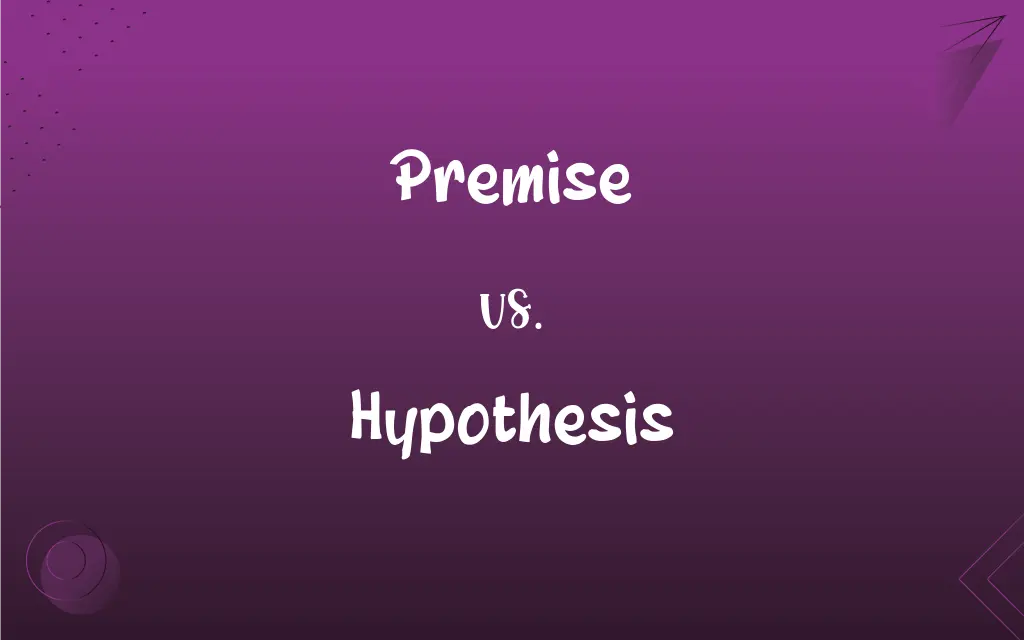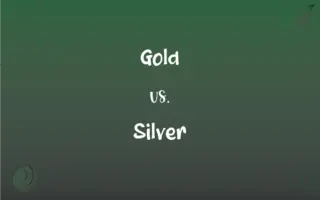Premise vs. Hypothesis: What's the Difference?
Edited by Aimie Carlson || By Janet White || Published on November 12, 2023
A Premise is a foundational statement in arguments, while a Hypothesis is a testable prediction in scientific research.

Key Differences
A Premise acts as a foundational or base statement upon which an argument or reasoning is constructed. In contrast, a Hypothesis is a proposed explanation or prediction for a phenomenon that can be tested through experimentation or observation.
When constructing logical arguments, the Premise serves as an accepted truth or fact that supports the conclusion drawn. A Hypothesis, on the other hand, isn't an accepted fact; it's a conjecture that scientists or researchers aim to validate or invalidate.
In everyday conversations, a Premise might refer to an underlying assumption or a starting point for discussion. Meanwhile, the term Hypothesis is primarily used in scientific contexts, denoting a preliminary idea that awaits verification through research.
While both Premise and Hypothesis serve as foundational elements in their respective domains, their roles are distinct. A valid Premise doesn't require empirical testing, whereas a Hypothesis specifically demands testing and evidence to be considered valid or invalid.
Both Premise and Hypothesis are essential in structuring thought. The former lays the groundwork for coherent reasoning, and the latter provides a direction for scientific investigation.
ADVERTISEMENT
Comparison Chart
Definition
Foundational statement in arguments
Testable prediction in research
Role
Supports conclusions in reasoning
A conjecture to be validated or invalidated
Usage Context
Logical arguments, everyday conversation
Scientific research
Requirement for Test
Not necessarily tested empirically
Requires empirical testing
Certainty Level
Accepted as true
A proposed idea awaiting verification
ADVERTISEMENT
Premise and Hypothesis Definitions
Premise
The initial position of a syllogism or logical structure.
His entire theory falls apart if the initial Premise is incorrect.
Hypothesis
A testable prediction in scientific research.
Her Hypothesis was that plants grow faster under blue light.
Premise
A proposition upon which a conclusion is drawn.
The contract was built on the Premise that both parties would cooperate.
Hypothesis
A proposed explanation made on limited evidence.
The detective's Hypothesis was based on the clues at the crime scene.
Premise
A proposition upon which an argument is based or from which a conclusion is drawn.
Hypothesis
A tentative assumption used for drawing conclusions.
Based on the Hypothesis, the scientist conducted several tests.
Premise
One of the propositions in a deductive argument.
Hypothesis
A foundation for further investigation.
The research began with a simple Hypothesis about cell behavior.
Premise
Either the major or the minor proposition of a syllogism, from which the conclusion is drawn.
Hypothesis
A tentative explanation for an observation, phenomenon, or scientific problem that can be tested by further investigation.
Premise
Land, the buildings on it, or both the land and the buildings on it.
Hypothesis
Something taken to be true for the purpose of argument or investigation; an assumption.
Premise
A building or particular portion of a building.
Hypothesis
The antecedent of a conditional statement.
Premise
(Law) The part of a deed that states the details of the conveyance of the property.
Hypothesis
(sciences) Used loosely, a tentative conjecture explaining an observation, phenomenon or scientific problem that can be tested by further observation, investigation and/or experimentation. As a scientific term of art, see the attached quotation. Compare to theory, and quotation given there.
Premise
To provide a basis for; base
"The American Revolution had been premised on a tacit bargain that regional conflicts would be subordinated to the need for unity among the states" (Ron Chernow).
Hypothesis
(general) An assumption taken to be true for the purpose of argument or investigation.
Premise
To state or assume as a proposition in an argument.
Hypothesis
(grammar) The antecedent of a conditional statement.
Premise
To state in advance as an introduction or explanation.
Hypothesis
A supposition; a proposition or principle which is supposed or taken for granted, in order to draw a conclusion or inference for proof of the point in question; something not proved, but assumed for the purpose of argument, or to account for a fact or an occurrence; as, the hypothesis that head winds detain an overdue steamer.
An hypothesis being a mere supposition, there are no other limits to hypotheses than those of the human imagination.
Premise
A proposition antecedently supposed or proved; something previously stated or assumed as the basis of further argument; a condition; a supposition.
Hypothesis
A tentative theory or supposition provisionally adopted to explain certain facts, and to guide in the investigation of others; hence, frequently called a working hypothesis.
Premise
(logic) Any of the first propositions of a syllogism, from which the conclusion is deduced.
Hypothesis
A proposal intended to explain certain facts or observations
Premise
Matters previously stated or set forth; especially, that part in the beginning of a deed, the office of which is to express the grantor and grantee, and the land or thing granted or conveyed, and all that precedes the habendum; the thing demised or granted.
Hypothesis
A tentative theory about the natural world; a concept that is not yet verified but that if true would explain certain facts or phenomena;
A scientific hypothesis that survives experimental testing becomes a scientific theory
He proposed a fresh theory of alkalis that later was accepted in chemical practices
Premise
A piece of real estate; a building and its adjuncts.
Trespass on another’s premises
Hypothesis
A message expressing an opinion based on incomplete evidence
Premise
(authorship) The fundamental concept that drives the plot of a film or other story.
Hypothesis
An educated guess awaiting verification.
His Hypothesis about the market's reaction proved to be correct.
Premise
To state or assume something as a proposition to an argument.
Premise
To make a premise.
Premise
To set forth beforehand, or as introductory to the main subject; to offer previously, as something to explain or aid in understanding what follows.
Premise
To send before the time, or beforehand; hence, to cause to be before something else; to employ previously.
Premise
A proposition antecedently supposed or proved; something previously stated or assumed as the basis of further argument; a condition; a supposition.
The premises observed,Thy will by my performance shall be served.
Premise
Either of the first two propositions of a syllogism, from which the conclusion is drawn.
While the premises stand firm, it is impossible to shake the conclusion.
Premise
Matters previously stated or set forth; esp., that part in the beginning of a deed, the office of which is to express the grantor and grantee, and the land or thing granted or conveyed, and all that precedes the habendum; the thing demised or granted.
Premise
A piece of real estate; a building and its adjuncts; as, to lease premises; to trespass on another's premises.
Premise
To send before the time, or beforehand; hence, to cause to be before something else; to employ previously.
The premised flames of the last day.
If venesection and a cathartic be premised.
Premise
To set forth beforehand, or as introductory to the main subject; to offer previously, as something to explain or aid in understanding what follows; especially, to lay down premises or first propositions, on which rest the subsequent reasonings.
I premise these particulars that the reader may know that I enter upon it as a very ungrateful task.
Premise
To make a premise; to set forth something as a premise.
Premise
A statement that is assumed to be true and from which a conclusion can be drawn;
On the assumption that he has been injured we can infer that he will not to play
Premise
Set forth beforehand, often as an explanation;
He premised these remarks so that his readers might understand
Premise
Furnish with a preface or introduction;
She always precedes her lectures with a joke
He prefaced his lecture with a critical remark about the institution
Premise
Take something as preexisting and given
Premise
A foundational statement in an argument.
The Premise of his argument is that all humans are inherently good.
Premise
An assumption or basis for reasoning.
The discussion started on the Premise that climate change is real.
Premise
An underlying factor or foundation.
The Premise of her story was that love conquers all.
FAQs
What's the main function of a Premise in an argument?
A Premise serves as a foundational statement supporting a conclusion.
Can a Premise be challenged?
Yes, a Premise can be challenged if it's not universally accepted or if it's flawed.
In what fields is the term Hypothesis commonly used?
The term Hypothesis is predominantly used in scientific and research fields.
Can the Premise of a story be fictional?
Yes, in literature or film, a Premise can be a fictional starting point or theme.
Is a Premise always factual?
While a Premise should be based on accepted truths, it might not always be factual or correct.
Is a Hypothesis always proven true?
No, a Hypothesis can be either validated or invalidated based on evidence.
Can an argument have multiple Premises?
Yes, an argument can have multiple Premises leading to a conclusion.
What happens if a Hypothesis is proven wrong?
If a Hypothesis is proven wrong, it's either modified or discarded, and new hypotheses may be proposed.
How does a Premise differ from a conclusion?
A Premise is a foundational statement, while a conclusion is a derived outcome based on the Premise or Premises.
Can one research project have multiple hypotheses?
Yes, a research project can involve testing multiple related or independent hypotheses.
Is a Hypothesis a definitive statement?
No, a Hypothesis is a tentative statement subject to testing and validation.
How is a Hypothesis tested?
A Hypothesis is tested through experiments, observations, or relevant research methods.
Why is understanding the Premise crucial in a debate?
Understanding the Premise ensures clarity in arguments and helps in addressing the core issue.
Can a story or film have more than one Premise?
Yes, a story or film can explore multiple themes or Premises.
What follows after testing a Hypothesis?
After testing, a Hypothesis is either accepted, rejected, or refined based on results.
Is it necessary for a Hypothesis to be original?
While originality is valued, a Hypothesis can also build upon or challenge existing ideas.
Are Premises only used in formal arguments?
No, Premises can be part of both formal and informal reasoning or discussions.
Can a flawed Premise lead to a valid conclusion?
A flawed Premise can lead to an invalid conclusion, but in some cases, the conclusion might accidentally be correct.
Is a Hypothesis the same as a theory?
No, a Hypothesis is a testable prediction, while a theory is a well-substantiated explanation based on a body of evidence.
Are hypotheses only for scientific inquiries?
While commonly used in science, hypotheses can also be used in other fields like economics or social studies.
About Author
Written by
Janet WhiteJanet White has been an esteemed writer and blogger for Difference Wiki. Holding a Master's degree in Science and Medical Journalism from the prestigious Boston University, she has consistently demonstrated her expertise and passion for her field. When she's not immersed in her work, Janet relishes her time exercising, delving into a good book, and cherishing moments with friends and family.
Edited by
Aimie CarlsonAimie Carlson, holding a master's degree in English literature, is a fervent English language enthusiast. She lends her writing talents to Difference Wiki, a prominent website that specializes in comparisons, offering readers insightful analyses that both captivate and inform.







































































